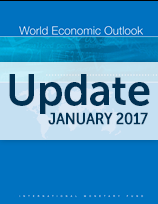Merler, Silvia, (2017), “The economic effects of migration”, Bruegel, 16 Ιανουαρίου What’s at stake: migration is currently a very hot topic in both the US and the EU. Immigration issues have come to the forefront due to the problem of rapidly ageing populations, the refugee crisis, and growing anti-immigration political rhetoric. But what do we know about the economic effects of migration? Σχετικές Αναρτήσεις Bertoncini, Yves, De Geus, Aart, Niblett, Robin, Styczynska, Izabela, Gastaldo, Piero, …Read More
How to balance sovereignty and integration in a voluntary EU
Dabrowski, Marek, (2017), “How to balance sovereignty and integration in a voluntary EU”, Bruegel, 12 Ιανουαρίου The principle of voluntary membership is a central value of the EU project, but it is also a source of many of its problems. How can the member states address those problems in order to repair the EU’s integration architecture? The European Union and its institutions are often criticised for their supposed ineffectiveness, slowness …Read More
Negative interest rates: absolutely everything you need to know
Blanke, Jennifer, Krogstrup, Signe, (2016), “Negative interest rates: absolutely everything you need to know”, World Economic Forum, 2 Νοεμβρίου Since the great recession, a large number of advanced economies have been stuck with low growth and low levels of investment and inflation. Attempting to regain growth, central banks have taken increasingly forceful monetary measures. Of these, perhaps the most controversial and least understood is negative interest rates. The central bank of …Read More
Banks Credit and Productivity Growth in the EU
Hassan, Fadi, di Mauro, Filippo, I.P. Ottaviano, Gianmarco, (2016), “Banks Credit and Productivity Growth in the EU”, European Investment Bank Working Papers 2016/05, 20 Δεκεμβρίου Financial institutions are key to allocate capital to its most productive uses. In order to examine the relationship between bank credit and firm-level productivity in the context of different financial markets set-ups, we introduce a model of overlapping generations of entrepreneurs under complete and incomplete credit …Read More
From Debt Collection to Relief Provision: 60 Years of Official Debt Restructurings through the Paris Club
Cheng, Gong, Diaz-Cassou, Javier, Erce, Aitor, (2016), “From Debt Collection to Relief Provision: 60 Years of Official Debt Restructurings through the Paris Club”, European Stability Mechanism, 22 Δεκεμβρίου Despite the frequency of official debt restructurings, little systematic evidence has been produced on their characteristics and implications. Using a dataset covering more than 400 Paris Club agreements, this paper aims to fill that gap. It provides a comprehensive description of the …Read More
Finance and growth: The direction of causality
Lin Chong, Eilyn Yee, Mody, Ashoka, Varela Sandoval, Francisco, (2017), “Finance and growth: The direction of causality”, VoxEu, 17 Ιανουαρίου Recent research suggests a point beyond which the benefits of financial development diminish, and further development can even hurt growth. This column describes how a negative relationship between credit and growth emerged strongly after 1990 and was particularly pronounced in the Eurozone, consistent with the notion that an overgrown financial sector weakens …Read More
World Economic Outlook Update – January 2017
International Monetary Fund, (2017), “World Economic Outlook Update – January 2017”, International Monetary Fund, Ιανουάριος After a lackluster outturn in 2016, economic activity is projected to pick up pace in 2017 and 2018, especially in emerging market and developing economies. However, there is a wide dispersion of possible outcomes around the projections, given uncertainty surrounding the policy stance of the incoming U.S. administration and its global ramifications. The assumptions underpinning …Read More
Economic Crises and the Crisis of Economics
Subacchi, Paola, (2017), “Economic Crises and the Crisis of Economics”, Project Syndicate, 13 Ιανουαρίου Is the economics profession “in crisis”? Many policymakers, such as Andy Haldane, the Bank of England’s chief economist, believe that it is. Indeed, a decade ago, economists failed to see a massive storm on the horizon, until it culminated in the most destructive global financial crisis in nearly 80 years. More recently, they misjudged the immediate …Read More
Management and Resolution of Banking Crises: Lessons from Recent European Experience
Honohan, Patrick, (2017), “Management and Resolution of Banking Crises: Lessons from Recent European Experience Patrick Honohan”, PIIE, Ιανουάριος 2017 After almost a decade of contrasting and somewhat unpredictable policy responses to each succeeding bank failure, global policy for bank resolution has coalesced around a new approach.1 Replacing the seeming arbitrariness of earlier actions, the new international framework is designed to allow failing banks to be resolved smoothly without damaging interruptions …Read More
The Need for Different Classes of Macroeconomic Models
Blanchard, Olivier, (2017), “The Need for Different Classes of Macroeconomic Models”, PIIE, 12 Ιανουαρίου Theory models, aimed at clarifying theoretical issues within a general equilibrium setting. Models in this class should build on a core analytical frame and have a tight theoretical structure. They should be used to think, for example, about the effects of higher required capital ratios for banks, or the effects of public debt management, or the effects …Read More





